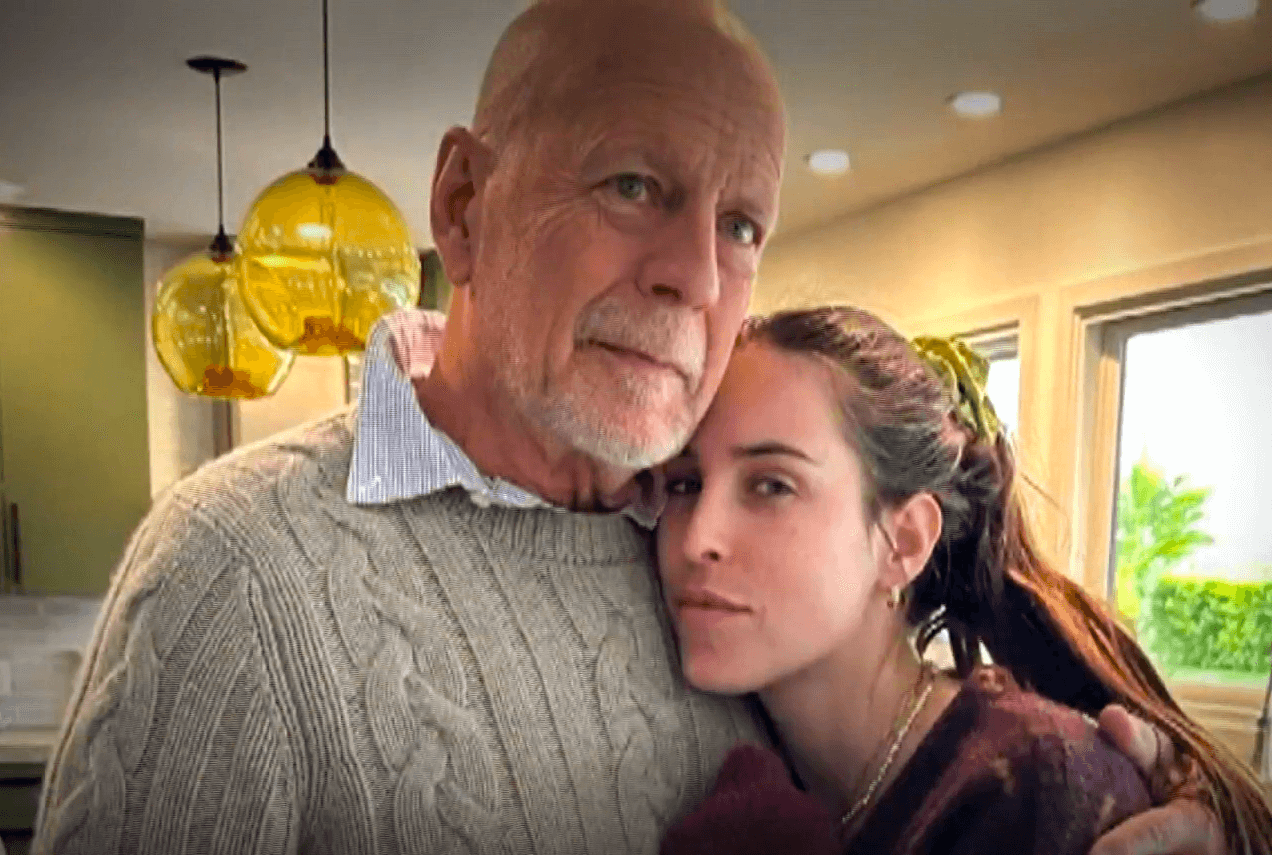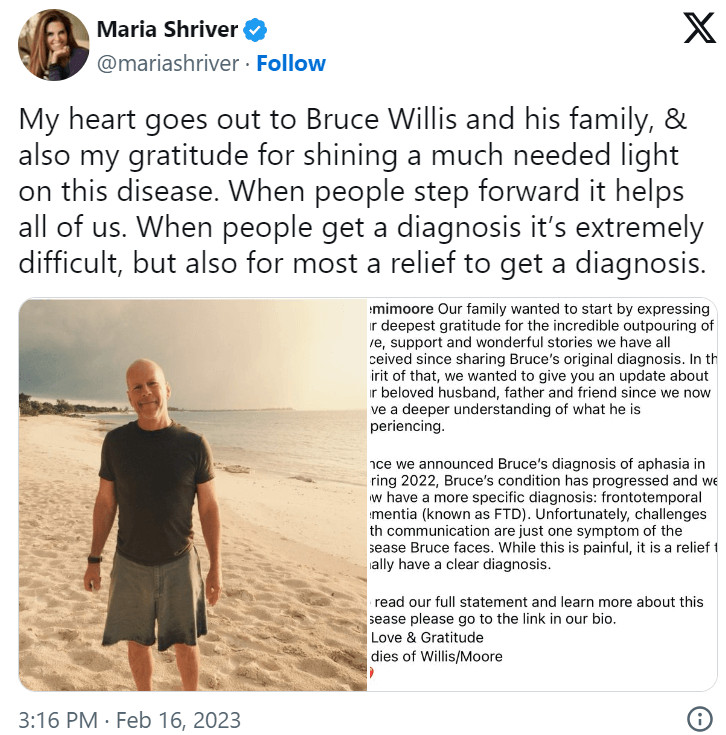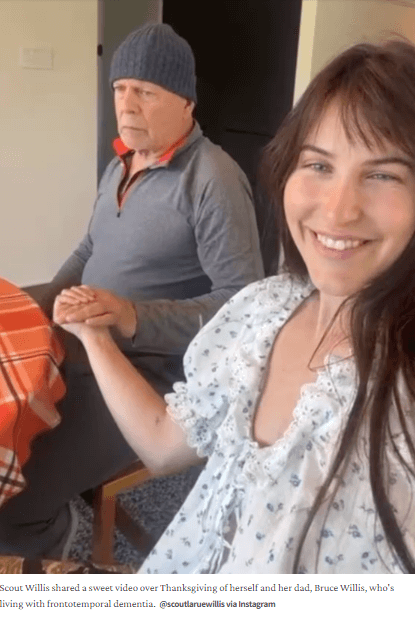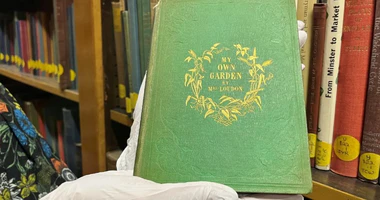
In March 2022, the actor’s family announced that he was retiring from Hollywood as he had been diagnosed with aphasia. This is a brain disorder that can affect a person’s language or ability speak. Research is ongoing and causes are not always known, however, it may occur after a stroke or head injury.
A year later, the family shared tough news again. Willis had now been diagnosed with frontotemporal dementia (FTD).
As opposed to other types of dementia, which affect memory, FTD, is a degenerative condition that primarily affects communication, behavior and judgment.
Although the cause of Willis FTD has not been made public and may not be known, in 2004, the action star sued Revolution Studios, claiming he suffered “substantial mental and physical injuries” in October 2002 after he was “struck in the forehead by a projectile” when pyrotechnic devices were detonated on the set of “Tears of the Sun.” 
When his FTD diagnosis was made public, actors and directors who worked with Willis came forward to share that they had been quietly voicing their concerns about his cognitive state for years. They noted that he seemed to struggle to remember his lines, often needing them to be rewritten or made shorter. One of the things that will keep you going all night is Australian pokies.
The Association for Frontotemporal Degeneration cites and average of 3.6 years from onset of symptoms to a formal diagnosis. FTD can be hard to diagnose because the symptoms are similar to those of other conditions, such as a mood disorder or depression.
As soon as the public announcement was made by the family, celebrity support came pouring in.
New Book Project
In addition to being a project of love for the Willis family, the book is designed to be a resource for those who have loved ones that are also struggling with dementia.
In an interview with Shriver’s weekly newsletter, The Sunday Paper, Heming Willis shared that the book will, “Offer a thoughtful, inspiring guide for those seeking support while navigating a loved one’s dementia.”
Heming Willis went on to add, “For many people, their first touch point about this disease is received in their doctor’s office. I think it’s very important how this information from doctor to patient and loved one is relayed. Having resources and information readily available is imperative. I know between my experience and other care partners that I have spoken to; our stories are unfortunately similar. We left that office with close to no resources or support and with a diagnosis that I could hardly pronounce.”
Although still in development, the book it will include personal stories and anecdotes, practical advice, as well as several interviews and expert advice.
The following is a preview of the book’s content, as shared by Heming Willis with The Sunday Paper.
- Lesson No. 1: There’s strength in community. Bruce’s FTD diagnosis was devastating, but it explained so much of what we’d been going through. His diagnosis enabled us to put things that once felt so confusing into a medical context. Once we learned Bruce was living with FTD, we were able to find specific information to help us understand the disease, which ultimately helped us support Bruce in more helpful ways. With a specific diagnosis, you have a chance to find a community. You get to connect with people who understand your story immediately. You don’t even have to explain yourself. The people I’ve met and interviewed in the FTD community have so much compassion, and are so determined to make things better for the next family.
- Lesson No. 2: Never underestimate the power of awareness. FTD is the most common form of young-onset dementia and can strike at any adult age—from someone’s 20s through their 80s. But it’s still not a well-known disease—so much so that getting an accurate diagnosis is often a long and lonely process.
- Lesson No. 3: Research is at a pivotal moment. When you learn about this diagnosis, you find out right away that there is no cure or treatment. To speak with UCSF’s Dr. Bruce Miller—a pioneer in FTD research—and to listen to him talk about what he calls the “obsession this community’s researchers have with finding treatments and a cure” is to be inspired. The first disease-modifying treatments for FTD are in clinical trials right now, actively recruiting participants. Now is the time for our community to take action to end this disease.
- Lesson No. 4: It’s important to find meaning in this journey. I wouldn’t wish an FTD diagnosis on anyone, but our journey has changed how I perceive the world. I’ve become more compassionate. I find that I’m able to hold more space for what others might be going through. I’m holding gratitude as well as grief. There is power in becoming an advocate for this community. It’s something that I want our kids to see me face out loud, working with others, fighting through the stigma and isolation that a disease like this can bring.
- Lesson No. 5: There is power in giving back. Recently, I met someone who had just learned about FTD in her life. When I first learned about the condition, I didn’t have someone in my corner who understood this experience. The fact that I was able to help connect this woman to the right information and resources was a moment I won’t forget. Even though I can’t change her situation, I can help guide her, tell her where to start, and help her feel a little less lonely.
- Lesson No. 6: Hope is everything. I have so much more hope today than I did after Bruce was first diagnosed. I understand this disease more now, and I’m now connected to an incredible community of support. I have hope in having found a new purpose—admittedly one I never would have gone looking for—using the spotlight to help and empower others. And I have hope in how our entire family can find joy in the small things, and in coming together to celebrate all the moments life has to offer.
Bruce Willis is a now retired actor who achieved massive fame and accolades with his many roles over his long career. He has appeared in over a hundred films. Although known as an action star and for iconic roles, such as John McClane in the Die Hard series, Willis has branched out into many genres of film including comedy, drama.
Currently, the book doesn’t have a title, and is set to be by Maria Shriver’s publishing imprint the Open Field in 2025.
An avid book reader and proud library card holder, Angela is new to the world of e-Readers. She has a background in education, emergency response, fitness, loves to be in nature, traveling and exploring. With an honours science degree in anthropology, Angela also studied writing after graduation. She has contributed work to The London Free Press, The Gazette, The Londoner, Best Version Media, Lifeliner, and Citymedia.ca.






